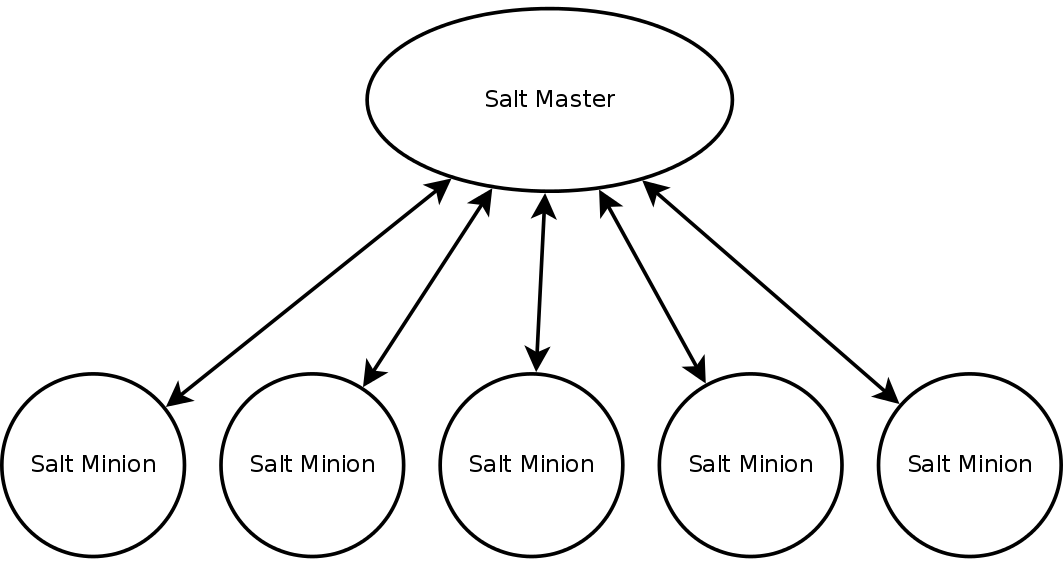SaltStack
Modernes Infrastrukturmanagement
Eine Einführung von Valentin Hoebel / @xenuser (Twitter)
Wer zum Teufel..?
- Valentin Höbel
- Cloud Architect @ NFON
- Arbeitet mit Linux und Open-Source-Software seit 2007
- Über 40 Veröffentlichungen in Online- und Printmedien (Linux Magazin, golem.de...)
Worum geht's heute?
- Grobe Einführung in SaltStack
- Vorteile, Nachteile
- Mögliche Einsatzszenarien
Ein paar Anmerkungen...
- Zwischenfragen sind immer willkommen...
- ... wenn möglich bitte vorm nächsten Folienwechsel
- Heute aus Zeitgründen leider keine Live-Demo :(
Bereit?
Stellt euch vor...
ihr müsst eine Vielzahl an Systemen verwalten...
Vielleicht auch verschiedene Plattformen?





Oder auch verschiedene Standorte?

Mit super viel Personal?

Die Lösung?

Hintergründe
- Erstmals aufgetaucht im März 2011
- Autor: Thomas Hatch
- Geschrieben für zentrale Infrastruktur-Verwaltung
- Löste damals verschiedene Probleme
- In Python geschrieben
- Open-Source-Software!
Im Angebot:
- Massive parallel sys administration
- Configuration Management
- Orchestration
Wie funktioniert's?
- Auf einem System wird der Salt-Master installiert
- Auf allen anderen der Salt-Minion
- Der Master sendet abstrahiert direkt Befehle an die Minions
- Die Minions setzen diese um und antworten mit dem Ergebnis


Warum abstrahiert?
Ein Beispiel:
- Master sendet "Meta-Befehl"
salt webserver1 pkg.install nginx - Minion empfängt Befehl..
und weiß für jedes OS, wie er umzusetzen ist - Meldung an den Master mit Ergebnis
Massive parallel sys administration
(oder auch: Remote Execution)- Gedacht für sofortige Ausführung von Aktionen
- Wird parallel auf allen Zielsystemen ausgeführt
Das Vorgehen
Aufruf des Salt-Masters mit gewünschten Zielen und einem Modul inkl. ParameterBeispiel:
salt "*" file.append "/etc/motd" "Welcome."
Aufschlüsselung
salt |
"*" |
file.append |
"/etc/motd" "Welcome." |
| Linux-Kommando | Zielangabe | modul.funktion | Parameter |
Vielfältige Zielauswahl
- Alles ("*")
- Namen inkl. Regex ("webserver01" oder "webserver*")
- An Hand von Eigenschaften ("Grains") (-G "os:Debian")
- Kombination (-C "G@os:Debian and webserver*")
Beispiele
salt "database0*" pkg.version mysql-serversalt -G "site:frankfurt" user.add "praktikant"salt -C "G@os:Fedora and client*" cmd.run "lastlog"Ausführliches Beispiel
salt "*" user.add praktikant shell=/bin/bash
database01:
True
webserver01:
True
client01:
True
Salt Grains
- Grains = Eigenschaften/Attribute
- Werden vom Minion selbst generiert
- Enthalten Informationen zu OS, Konfiguration und HW
- Können überall einbezogen/abgefragt werden
- Eigene Grains sind möglich (Rolle, Standort...)
- Grains sind mit Facts von Puppet vergleichbar
Auflistung von Grains auf einem Minion:
root@ubuntu:~# salt "ubuntu" grains.items
ubuntu:
----------
SSDs:
biosreleasedate:
07/02/2015
biosversion:
6.00
cpu_flags:
- fpu
- vme
- de
- pse
- tsc
- msr
- pae
- mce
- cx8
- apic
- sep
- mtrr
- pge
- mca
- cmov
- pat
- pse36
- clflush
- dts
- mmx
- fxsr
- sse
- sse2
- ss
- syscall
- nx
- pdpe1gb
- rdtscp
- lm
- constant_tsc
- arch_perfmon
- pebs
- bts
- nopl
- xtopology
- tsc_reliable
- nonstop_tsc
- aperfmperf
- eagerfpu
- pni
- pclmulqdq
- ssse3
- fma
- cx16
- pcid
- sse4_1
- sse4_2
- x2apic
- movbe
- popcnt
- tsc_deadline_timer
- aes
- xsave
- avx
- f16c
- rdrand
- hypervisor
- lahf_lm
- abm
- 3dnowprefetch
- ida
- arat
- pln
- pts
- dtherm
- hwp
- hwp_noitfy
- hwp_act_window
- hwp_epp
- fsgsbase
- tsc_adjust
- bmi1
- hle
- avx2
- smep
- bmi2
- invpcid
- rtm
- rdseed
- adx
- smap
- xsaveopt
- xsavec
- xgetbv1
cpu_model:
Intel(R) Core(TM) i7-6700 CPU @ 3.40GHz
cpuarch:
x86_64
domain:
fqdn:
ubuntu
fqdn_ip4:
- 127.0.1.1
fqdn_ip6:
gpus:
|_
----------
model:
SVGA II Adapter
vendor:
unknown
host:
ubuntu
hwaddr_interfaces:
----------
eno16777736:
00:0c:29:a7:cf:5a
lo:
00:00:00:00:00:00
id:
ubuntu
init:
systemd
ip4_interfaces:
----------
eno16777736:
- 192.168.126.129
- 192.168.126.132
lo:
- 127.0.0.1
ip6_interfaces:
----------
eno16777736:
- fe80::20c:29ff:fea7:cf5a
- 192.168.126.132
lo:
- ::1
ip_interfaces:
----------
eno16777736:
- 192.168.126.129
- fe80::20c:29ff:fea7:cf5a
- 192.168.126.132
lo:
- 127.0.0.1
- ::1
ipv4:
- 127.0.0.1
- 192.168.126.129
- 192.168.126.132
ipv6:
- ::1
- fe80::20c:29ff:fea7:cf5a
kernel:
Linux
kernelrelease:
4.2.0-16-generic
locale_info:
----------
defaultencoding:
UTF-8
defaultlanguage:
en_US
detectedencoding:
UTF-8
localhost:
ubuntu
lsb_distrib_codename:
wily
lsb_distrib_description:
Ubuntu 15.10
lsb_distrib_id:
Ubuntu
lsb_distrib_release:
15.10
machine_id:
2af64fc78adf4b8ba44c1b51f10371e2
manufacturer:
VMware, Inc.
master:
localhost
mdadm:
mem_total:
2991
nodename:
ubuntu
num_cpus:
2
num_gpus:
1
os:
Ubuntu
os_family:
Debian
osarch:
amd64
oscodename:
wily
osfinger:
Ubuntu-15.10
osfullname:
Ubuntu
osrelease:
15.10
osrelease_info:
- 15
- 10
path:
/usr/local/sbin:/usr/local/bin:/usr/sbin:/usr/bin:/sbin:/bin
productname:
VMware Virtual Platform
ps:
ps -efHww
pythonexecutable:
/usr/bin/python
pythonpath:
- /usr/bin
- /usr/lib/python2.7
- /usr/lib/python2.7/plat-x86_64-linux-gnu
- /usr/lib/python2.7/lib-tk
- /usr/lib/python2.7/lib-old
- /usr/lib/python2.7/lib-dynload
- /usr/local/lib/python2.7/dist-packages
- /usr/lib/python2.7/dist-packages
- /usr/lib/python2.7/dist-packages/PILcompat
- /usr/lib/python2.7/dist-packages/ubuntu-sso-client
pythonversion:
- 2
- 7
- 10
- final
- 0
saltpath:
/usr/lib/python2.7/dist-packages/salt
saltversion:
2015.5.3
saltversioninfo:
- 2015
- 5
- 3
- 0
serialnumber:
VMware-56 4d f9 5c be f4 5a ff-4b 98 af c7 fc a7 cf 5a
server_id:
1819121879
shell:
/bin/sh
systemd:
----------
features:
+PAM +AUDIT +SELINUX +IMA +APPARMOR +SMACK +SYSVINIT +UTMP +LIBCRYPTSETUP +GCRYPT +GNUTLS +ACL +XZ -LZ4 +SECCOMP +BLKID -ELFUTILS +KMOD -IDN
version:
225
virtual:
VMware
zmqversion:
4.0.5
Eigene Grains können wie folgt definiert werden:
- Hard-coded in Minion-Config-File (statisch)
- Script-generated (dynamisch)
Module und Funktionen
Module bieten ein Bündel an Funktionen für Remote-Execution an
Module beziehen sich auf ein Thema (z. B. User, Gruppen, Paket-Handling, MySQL)
Module abstrahieren das Arbeiten - "Meta-Befehle" (wie pkg.install) werden plattformspezifisch umgesetzt
Zahlreiche Module verfügbar..
| Pkg | cron | DRBD | Apache | file | firewalld | git |
| glusterfs | group | hadoop | haproxy | ilo | DRAC | ipmi |
| kerberos | logrotate | LVM | LXC | memcached | munin | mysql |
| nagios | oracle | postfix | postgres | rabbitmq | s3 | selinux |
| splunk | sqlite | systemd | udev | useradd | win | cmd |
Module helfen auch beim Aufsetzen von Diensten
Module erlauben hohen Grad an Automatisierung
Module können in eigene Scripte eingebettet werden
Beispiele!
root@ubuntu:~# salt "ubuntu" pkg.install htop
ubuntu:
----------
htop:
----------
new:
1.0.3-1
old:
root@ubuntu:~# salt "ubuntu" service.restart apache2
ubuntu:
True
root@ubuntu:~# salt "ubuntu" cron.set_job root "*" "*" "*" "*" "*" "mycommand"
ubuntu:
new
root@ubuntu:~# salt "ubuntu" cron.ls root
ubuntu:
----------
crons:
|_
----------
cmd:
mycommand
comment:
None
daymonth:
*
dayweek:
*
hour:
*
identifier:
None
minute:
*
month:
*
env:
pre:
special:
root@ubuntu:~# salt "ubuntu" mount.fstab
ubuntu:
----------
/:
----------
device:
overlay
dump:
0
fstype:
overlay
opts:
- rw
pass:
0
/tmp:
----------
device:
tmpfs
dump:
0
fstype:
tmpfs
opts:
- nosuid
- nodev
pass:
0
Configuration Management
- Installiert und konfiguriert Dienste/Umgebungen
- Module verfügbar, heissen aber States
- Bezieht sich i.d.R. auf ein Zielsystem oder eine Gruppe an Zielsystemen
Vorgehensweise:
- State-Files schreiben
- Im Filesystem auf Master-Server ablegen
- States auf Minion(s) applyen
- Minion synct sich die State-Files
- Minion führt State-Files aus
- Minion meldet sich mit Ergebnis beim Master
Ein paar Infos..
Inhalte fürs Config-Mgmt können direkt im Filesystem...
oder auch im Git liegen
States können manuell angewandt werden
oder automatisiert auf den Minions, z. B. via Cron
So gelingt der Einstieg
- Verzeichnisstruktur mit States und Pillars erstellen
- States den Zielsystemen in s.g. "top.sls"-Dateien zuordnen
- States anwenden
(Pillars sind selbstdefinierte Attribute, wie VHost- oder Benutzernamen)
(Im "Key:Value"-Format)
(Frei definierbar)
Verzeichnisstruktur unter /srv/salt auf dem Master-Server
root@ubuntu:~# tree /srv/salt/
/srv/salt/
├── pillars
│ ├── top.sls <-- Weist Attribute bestimmten Servern zu
│ └── webservers
│ ├── users.sls <-- Definiert Benutzer
│ └── vhosts.sls <-- Definiert VHosts
└── states
├── top.sls <--- Weist bestimmte States bestimmten Servern zu
├── users.sls <--- Legt Benutzer aus Pillars an
└── webservers
├── apache.sls <-- Installiert Apache
└── nginx.sls <-- Installiert Nginx
4 directories, 7 files
Anwendung:
salt "ubuntu" state.highstate
Im Detail..
pillars/top.sls:
base:
"ubuntu":
- webservers.users
- webservers.vhosts
pillars/webservers/users.sls:
users:
- valentin.hoebel
- max.mustermann
- hans.wurst
- local.horst
pillars/webservers/vhosts.sls:
vhosts:
- hoebel.net
- xenuser.org
- localhost
Kontrolle:
root@ubuntu:/srv/salt/pillars/webservers# salt "ubuntu" pillar.items
ubuntu:
----------
users:
- valentin.hoebel
- max.mustermann
- hans.wurst
- local.horst
vhosts:
- hoebel.net
- xenuser.org
- localhost
states/top.sls:
base:
"ubuntu":
- users
- webservers.apache
states/users.sls:
{% for user in pillar['users'] %}
{{ user }}:
user.present:
- shell: /bin/bash
- home: /home/{{ user }}
{% endfor %}
states/webserver/apache.sls:
apache2:
pkg.installed
Ausführung:
root@ubuntu:/srv/salt/states# salt ubuntu state.highstate
ubuntu:
----------
ID: valentin.hoebel
Function: user.present
Result: True
Comment: New user valentin.hoebel created
Started: 12:07:22.116277
Duration: 17.248 ms
Changes:
----------
fullname:
gid:
1000
groups:
- valentin.hoebel
home:
/home/valentin.hoebel
homephone:
name:
valentin.hoebel
passwd:
x
roomnumber:
shell:
/bin/bash
uid:
1000
workphone:
----------
ID: max.mustermann
Function: user.present
Result: True
Comment: New user max.mustermann created
Started: 12:07:22.133608
Duration: 12.644 ms
Changes:
----------
fullname:
gid:
1001
groups:
- max.mustermann
home:
/home/max.mustermann
homephone:
name:
max.mustermann
passwd:
x
roomnumber:
shell:
/bin/bash
uid:
1001
workphone:
----------
ID: hans.wurst
Function: user.present
Result: True
Comment: New user hans.wurst created
Started: 12:07:22.146331
Duration: 8.521 ms
Changes:
----------
fullname:
gid:
1002
groups:
- hans.wurst
home:
/home/hans.wurst
homephone:
name:
hans.wurst
passwd:
x
roomnumber:
shell:
/bin/bash
uid:
1002
workphone:
----------
ID: local.horst
Function: user.present
Result: True
Comment: New user local.horst created
Started: 12:07:22.154930
Duration: 7.544 ms
Changes:
----------
fullname:
gid:
1003
groups:
- local.horst
home:
/home/local.horst
homephone:
name:
local.horst
passwd:
x
roomnumber:
shell:
/bin/bash
uid:
1003
workphone:
----------
ID: apache2
Function: pkg.installed
Result: True
Comment: The following packages were installed/updated: apache2
Started: 12:07:22.304957
Duration: 4925.393 ms
Changes:
----------
apache2:
----------
new:
2.4.12-2ubuntu2.1
old:
apache2-api-20120211:
----------
new:
1
old:
apache2-bin:
----------
new:
2.4.12-2ubuntu2.1
old:
apache2-data:
----------
new:
2.4.12-2ubuntu2.1
old:
apache2-utils:
----------
new:
2.4.12-2ubuntu2.1
old:
httpd:
----------
new:
1
old:
httpd-cgi:
----------
new:
1
old:
Summary
------------
Succeeded: 5 (changed=5)
Failed: 0
------------
Total states run: 5
Ein paar Tipps:
- Pillars verwenden, wann immer möglich
- Modular schreiben für Wiederverwendbarkeit
- Saubere Verzeichnisstruktur pflegen wgn. Übersicht
- Besser viele kleine States als Monster-States
Orchestration
- Kann Aktionen in gewünschter Reihenfolge abarbeiten
- Abhängigkeiten definierbar
- Führt Module und States (Mischung aus Remote-Execution und Config-Mgmt)..
- ..systemübergreifend aus
Vorgehensweise:
- Plan erstellen
- State-Files schreiben
- Orchestration-State (Masterplan) schreiben
- Im Filesystem auf Master-Server ablegen
- Orchestrierung anwenden
Ein Beispiel
Load-Balancer-Umgebung

Die Herausforderung
- Reihenfolge: Erst Backends, dann Load-Balancer
- Abhängigkeit: Load-Balancer erst, wenn Backends funktional
Der Plan
- Setze backend01 auf
- Setze backend02 auf
- Prüfe beide Backends
- Setze Load-Balancer auf
- Prüfe Load-Balancer
- Einträge in Nagios erzeugen o.ä.
Leider kein veranschaulichendes Beispiel aus Zeit- und Platzgründen
Weitere Beispiele für Orchestrierung
Einrichtung MySQL-Replika
Einrichtung von Clustern
Technische Umsetzung von (komplexen) Workflows
Was kann Salt noch?
Salt Cloud
Salt Cloud provisioniert und verwaltet Systeme in Cloud- und Virtualisierungsumgebungen
Unterstützt zahlreiche Anbieter und Lösungen, wie Amazon EC2, Azure, Digital Ocean, Google Compute, Joyent, Rackspace, OpenStack, VMWare..
Damit wird Salt zum Management-Werkzeug für hybride Clouds!
Salt Mine
Daten von Minions werden auf Master gespeichert
Aktualisierung der Daten in kurzen Intervallen (anders als Grains)
Die Daten stehen überall in Salt zur Verfügung
Beispiel: Erfassung von Metriken
Erlaubt dynamisches Verhalten bei unterschiedlichen Werten
Salt Reactor
Salt Reactors lauschen auf spezifizierte Events...
.. und können dann Aktionen lostreten
Beispiele:
- Neue Backends tragen sich automatisch im LB ein
- Neue Hosts tragen sich automatisch im Nagios ein
Salt Syndic

"Zwischen-Master" bzw. "Pass-Through-Master"
Salt Proxy
Eine Art Light-Minion für Kommunikation mit Drittgeräten...
... auf denen kein Salt-Minion laufen kann
Kommunikations-Interface muss i.d.R. selbst geschrieben werden
Beispiele für Drittsysteme: Netzwerk-Geräte, Lampen, IoT-Geräte, Smartphones
Voraussetzung: Ziel ist "irgendwie" über eine IP erreichbar
Mehr Infos hier.
Weitere Features
- Files auf Minion kopieren
- Files von Minions einsammeln
- Rückgabe von Minion in MySQL speichern ("Returner")
Fast geschafft ;)
Vorteile von SaltStack
- "Viele Tools in einem"
- Riesiger Funktionsumfang
- Schnell, parallel, skalierbar (10.000e Server), flexibel
- Benötigt *kein* SSH!
- Fundament für Vollautomatisierung
- Viel Dokumentation verfügbar
- Große Community
Nachteile von SaltStack
- Gewisse Einstiegshürden bei Config-Mgmt
- Personal zu finden ist nicht ganz leicht
- Anzahl an Büchern und deutschsprachigen Artikeln begrenzt
- Hat Abhängigkeit von Python
Typische Einsatzszenarien
| Infrastruktur-Mgmt. | Config-Mgmt. | Automatisierung |
| Standardisierung | Umsetzung von Workflows | Client-Verwaltung |
Präsentationsende
Modernes Infrastrukturmanagement
mit SaltStack
Eine Einführung von Valentin Hoebel
Quellen: Bilder/Fotos / Diagramme / SaltStack-Dokumentation
Präsentation erstellt mit Reveal.JS.
Download hier (https://github.com/xenuser/saltstackpresentation).